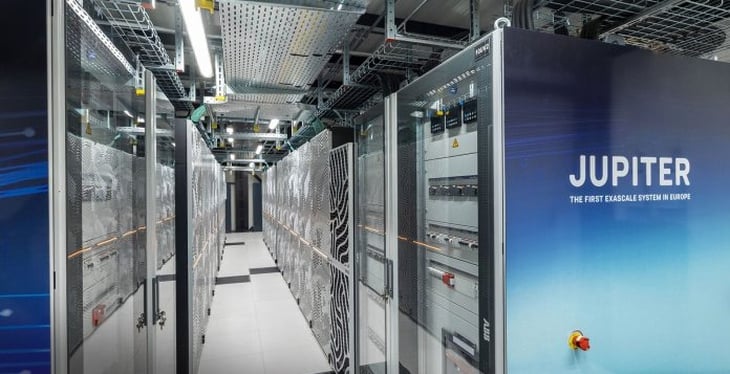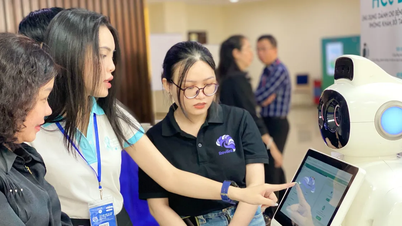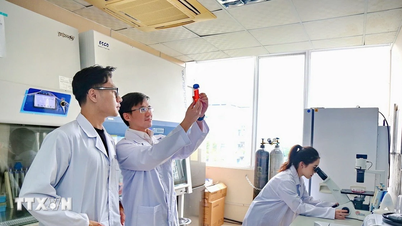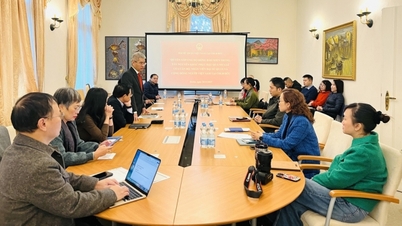
Supercomputer “Jupiter” worth half a billion euros - Photo: Nvidia
On September 5, German Chancellor Friedrich Merz and North Rhine-Westphalia (Nordrhein-Westfalen) State Premier Hendrik Wüst attended the launch ceremony of the 500 million euro "Jupiter" supercomputer, located at the Jülich Research Center near the city of Aachen. This supercomputer is operated entirely on green electricity and is capable of performing one trillion calculations per second.
The German chancellor said it was one of the world's fastest supercomputers, which could open up "completely new possibilities for training artificial intelligence models or scientific simulations".
He asserted that the Jupiter supercomputer, currently ranked fourth in the world in terms of speed, demonstrates Germany's ambition to play a leading role in the contemporary technological revolution.
"The US and China are currently competing fiercely to capture future market share, but Europe and Germany still have many opportunities to catch up," Mr. Merz emphasized.
Jupiter runs entirely on renewable electricity and is the world's most energy-efficient supercomputer, said Astrid Lambrecht, director of the Jülich Research Center.
“In an age where digitalization and artificial intelligence are increasingly demanding on energy, the Jupiter supercomputer shows how we can save resources,” she said.
Also at the launch ceremony, Ms. Lambrecht affirmed that Germany must accelerate in the field of artificial intelligence. In addition, she said that the worst-case scenario that one day supercomputers equipped with artificial intelligence could take over humanity is unrealistic.
The Jupiter supercomputer's computing center was built in two years, consisting of about 50 container modules with an area of more than 2,300m². The data it can store is equivalent to 450 billion books. Ms. Lambrecht affirmed: "Jupiter is really powerful and is the first computer in Europe capable of performing more than a trillion calculations per second."
The name "Jupiter" stands for "Joint Undertaking Pioneer for Innovative and Transformative Exascale Research". The cost of the supercomputer is around 500 million euros, of which the European Commission contributes 250 million, and the Federal Ministry of Science and the state of North Rhine-Westphalia each contribute 125 million euros.
Jupiter will also be used to improve climate and weather simulations, helping to better predict extreme events like heavy rain or severe storms. It will also be used to study proteins, cells and the human brain to speed up the development of new treatments.
The world’s major corporations are pursuing the goal of creating a more advanced artificial intelligence capable of solving humanity’s biggest problems and acting as an all-powerful assistant. However, critics fear such technology will spiral out of control, while more optimistic people say the concerns are overblown.
Source: https://tuoitre.vn/duc-tung-sieu-may-tinh-xanh-lam-mot-nghin-ti-phep-tinh-moi-giay-20250906112321831.htm



![[Photo] 60th Anniversary of the Founding of the Vietnam Association of Photographic Artists](/_next/image?url=https%3A%2F%2Fvphoto.vietnam.vn%2Fthumb%2F1200x675%2Fvietnam%2Fresource%2FIMAGE%2F2025%2F12%2F05%2F1764935864512_a1-bnd-0841-9740-jpg.webp&w=3840&q=75)
![[Photo] National Assembly Chairman Tran Thanh Man attends the VinFuture 2025 Award Ceremony](/_next/image?url=https%3A%2F%2Fvphoto.vietnam.vn%2Fthumb%2F1200x675%2Fvietnam%2Fresource%2FIMAGE%2F2025%2F12%2F05%2F1764951162416_2628509768338816493-6995-jpg.webp&w=3840&q=75)









































































































Comment (0)